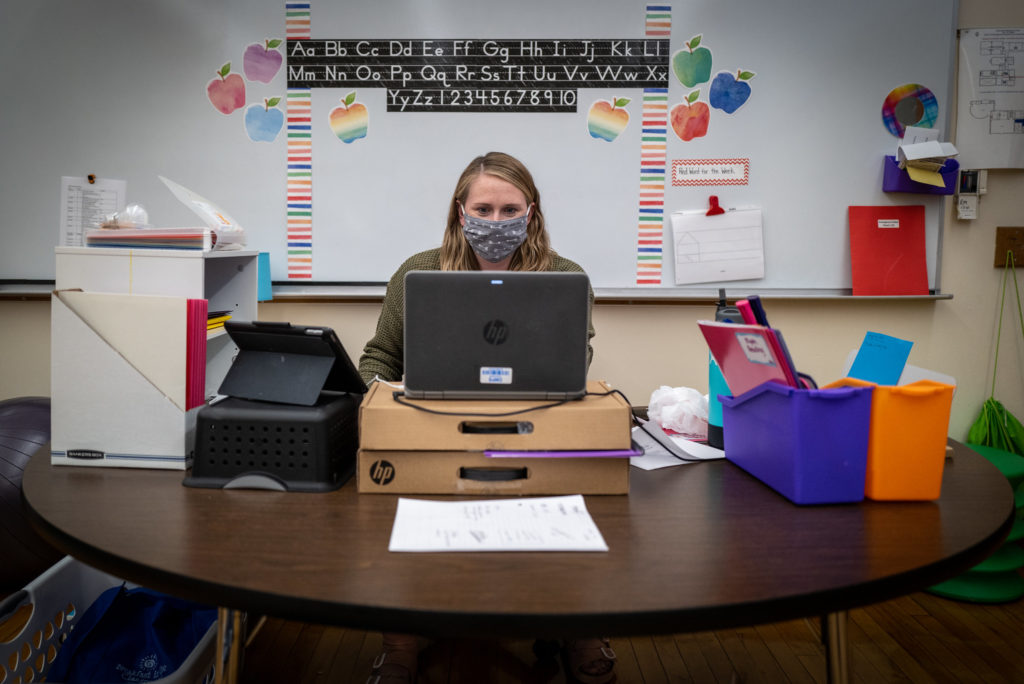It has long been assumed that teacher stress and associated behaviors, coping patterns, and burnout influence student well-being. However, little is known about what specific aspects of teacher emotional processes matter in relation to student outcomes.
A recent study conducted by Braun, Schonert-Reichl, and Roeser, published in the Journal of Applied Developmental Psychology, investigated some of these previously unexplored areas. Specifically, the authors looked at the relationship between a variety of self-reported teacher characteristics (associated with emotion and emotion regulation) measured during a recent fall term and a variety of self-reported student-level indications of well-being assessed at multiple time points throughout the school year.
Their findings indicate that there may be some direct links between teacher emotion regulation skills, life satisfaction, and student well-being outcomes. They write:
“The current study aims to address this gap in the literature by investigating the effect of teachers’ emotion regulation skills, occupational burnout, and life satisfaction on the level and development of their students’ well-being across one school year.”

According to the ecological systems model, child development is influenced by genetic qualities and one’s immediate family and the characteristics of several additional layers of environmental influence – schools included. For instance, past research has indicated that teacher gestures and words of support, individualized attention to students, and positive school climate in general all contribute to positive student outcomes.
Parental emotion regulation patterns (e.g., emotion suppression) seem to influence student social engagement and other aspects of well-being. Given the emotionally charged nature of school and the amount of time children spend there, the researchers hypothesized that school personnel emotion regulation might similarly exert impact.
Teaching is a demanding occupation associated with significant responsibility and high rates of burnout. Within a single class period, there are abundant opportunities for interaction, miscommunication, and student and teacher successes and failures. Teaching requires frequent emotion regulation – and what this means varies by instructor.
Adding to teachers’ cognitive and emotional demands during the 2020-2021 school year are complex modifications to curricula, instruction modality, and school format related to COVID-19 precautions on a global scale. Although Braun and colleagues’ study was conducted pre-COVID-19, the current situation may make their findings particularly pertinent.
The present study included both 4th and 5th-grade teachers (N=15) as well as 4th and 5th-grade students (N=320) in two Canadian public-school districts. Teacher-level characteristics of interest comprised self-reported emotion regulation skills (i.e., cognitive reappraisal and expressive suppression), occupational burnout, and life satisfaction. Teacher data were collected only once.
The researchers also looked at student well-being – a multi-faceted construct – according to positive outlook, emotional distress, and prosocial behavior at three-time points throughout the school year. Multilevel growth modeling was used to examine relationships between levels of teacher and student responses, in addition to teacher ratings in relation to student characteristic trajectories across the three-time points.
“This study aimed to examine the association between teachers’ emotion regulation skills, occupational burnout, and life satisfaction, and the level and trajectory of their students’ well-being (e.g., positive outlook, emotional distress, and prosocial behavior) across the school year. Results demonstrated that teachers’ emotion regulation skills and life satisfaction were associated with the end of year level of, though not change across the year in, students’ positive outlook, emotional distress, and prosocial behavior.”
The study results revealed that teacher emotional characteristics were not associated with shifts in student well-being over time. Still, they were related to student well-being at the time point closest to the end of the year.
In relation to two facets of emotion regulation, higher ratings of teacher cognitive reappraisal – “an emotion regulation strategy that involves re-conceptualizing a potentially emotion-eliciting situation in a more positive or less emotional way” – were connected to lower ratings of distress among students. Higher ratings of emotion suppression – “the extent to which teachers suppressed the expression of both positive and negative emotions in the classroom” – were connected to lower ratings of student prosocial behaviors.
Additionally, a relationship was found between teacher life satisfaction and end-of-year student prosocial behaviors. Contrary to what researchers hypothesized, teacher occupational burnout ratings were not significantly linked to student well-being indicators. Braun and team highlight that burnout (and other teacher-associated variables) may impact student outcomes beyond the scope of variables measured in this study.
In simpler terms, students may respond better to teacher patterns of positive reframing and flexibility than teacher suppression of emotion. Naturally, teacher life satisfaction may promote positive student outcomes. Capacity for emotion regulation and life satisfaction are areas vulnerable to external pressures, and authors suggest teachers could benefit from increased support targeting their emotional processes and well-being.
“Overall, results provide empirical support for theoretical perspectives emphasizing the importance of teachers’ emotion regulation skills, occupational health, and personal well-being; suggest that these teacher-level factors can have wide-ranging consequences for students, and elucidate key malleable targets for intervention in professional development programs aimed at improving the well-being of teachers.”
****
Braun, S. S., Schonert-Reichl, K. A., & Roeser, R. W. (2020). Effects of teachers’ emotion regulation, burnout, and life satisfaction on student well-being. Journal of Applied Developmental Psychology, 69, 101151. DOI:10.1016/j.appdev.2020.101151 (Link)















The latest catchword.
“emotional regulation”
Followed by “disorder”
Report comment
Anyone who gets upset about anything for any reason has an “emotional regulation disorder.” Especially if you get upset at THEM!
Report comment
How very accurate Steve.
And in this way, they can lump a whole ton of people into “disorder” category.
Report comment